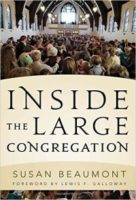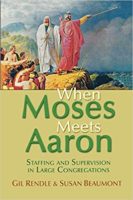Leaders utter a predictable battle cry when faced with possible organizational changes. “Our polity won’t allow us to do that!” They may want to consider changes that will make their organization more nimble, flexible and efficient, but they suspect that polity (denominational governance systems) will stand in the way.
We live in an era where thoughtful experimentation is critical to survival. Congregations and the institutions that support them will not thrive unless they are able to design and learn from bold experiments. And yet, we cling to our polity like a drowning person clings to a lifeline. We blame our polity for our unwillingness to change. We cite our constitutions, our by-laws, the Book of Order, or the Book of Discipline as reason for our inability and unwillingness to adapt.
Why is it that congregations who would never embrace a literal interpretation of scripture, without critical theological reflection, are so willing to cling to a literal interpretation of governance practice? How can we learn to use our polity to support adaptation, rather than resist it?
Our Devotion to Our Polity
Within the traditional mainline church, the distinctions between us are more readily identified by polity differences than by uniqueness of doctrine. It is often hard to distinguish between the beliefs and worship styles of congregations that call themselves Methodist, Presbyterian, or Congregational in a particular locale. You can’t fully appreciate the differences until you also consider governance. We distinguish ourselves based on whether we vest ultimate authority in a bishop, an elder governing board, or in the membership body.
Our understanding of our relationship with God informs how we decide to get things done, establish authority, and represent the voice of membership. Congregations believe certain things about governance, based upon their doctrinal stance. Polity determines how rules and procedures are developed, sustained and sanctioned
Every polity undergoes developmental change over time. As institutions move through developmental life cycles, governance practices and policy statements tend to become more restrictive. Leaders wrestle with each new problem situation that emerges and eventually codify their decision in policy. Over time our policy books become increasingly complex, overly bureaucratic, and artificially binding in ways that no longer represent the original spirit of intent. We lose flexibility. We become institutionalized.
Practicing Critical Interpretation
We must live into fresh expressions of polity if we are going to embrace change. We can’t wait for permission, in the form of governance change, to begin experimenting. We experiment first, and adapt policy later based on what we learn. We also acknowledge that not all forms of experimentation are appropriate in every setting. The appropriateness of an experiment is determined by the principles and beliefs that undergird our way of life.
For example, a Baptist congregation is facing senior pastor transition for the first time in eighteen years. The congregation is healthy, vibrant and is experiencing momentum in key areas. Traditional Baptist polity requires waiting to begin search for a new senior pastor until after the current senior pastor retires. This will require an eighteen to twenty-four month interim leadership period. Congregational leaders fear that an interim period will result in harmful loss of momentum and may have irreversible impact on giving and membership growth.
Congregational leaders would like to consider a direct pastor to pastor transition, with the pastoral search process taking place prior to the retirement of the current senior pastor. They would like to forgo an interim pastorate time period, and have the new pastor begin before the current pastor retires. This is not traditional practice in the denomination. Should leaders consider this course of action?
What are our core values?
First, this congregation must consider whether they have basic support from denominational leaders to experiment with a new form of pastoral transition. Without support they won’t be able to access the denomination’s candidate data base. Assuming denominational buy in, how do they determine which experiments are appropriate for their context? They begin by identifying the core values, beliefs and principles that undergird the policy in question.
Baptist polity honors a handful of ideological principles; the priesthood of all believers, the authority of the bible, the autonomy of the local church, non-creedal faith, separation of church and state, the right of dissent, and unity within diversity.
The use of interim pastorates is meant to protect the autonomy of the local church. A Baptist congregation makes its own choices about leadership, without undue influence from the current pastor or denominational staff. An interim minister provides a buffer to protect the voice of the membership body. Self-study and search wait until after the departure of the incumbent senior minister to encourage the congregation to express its authentic voice.
A direct pastor to pastor transition might also undermine the priesthood of all believers, which emphasizes individual soul competency before God. A period of time without a permanent senior pastor in place encourages each individual to explore the sacredness of individual choice in their personal relationship with God, without reliance on the long-tenured pastor as mediating influence.
Choosing with integrity
Ultimately, the leaders of this congregation designed a pastoral transition process that protected these basic tenets, without making use of an interim. They determined that the use of an interim minister was only one possible way to advance their core principles. Instead, they hired an interim consultant who guided the congregation’s self-study and the preparation of a church profile. This role created space for independent thought and the expression of soul. Leaders also created a transition process which gently diminished the current pastor’s presence in the pulpit and at governing board meetings, in the period of time leading up to her retirement. They gradually increased the leadership voice of the new senior pastor during the same time period. These choices nurtured a seamless leadership transition, while honoring the principles of soul freedom and the autonomy of the local congregation.
We don’t have to force artificial choices between adaptive change and our polity. We can craft experiments that honor the principles behind our polity, without being held captive by traditional practice. We need the freedom to think critically, evaluate and adapt. This is how we live our way into a new era with our core identity and our polity intact.
Susan Beaumont is a coach, educator, and consultant who has worked with hundreds of faith communities across the United States and Canada. Susan is known for working at the intersection of organizational health and spiritual vitality. She specializes in large church dynamics, staff team health, board development, and leadership during seasons of transition.
With both an M.B.A. and an M.Div., Susan blends business acumen with spiritual practice. She moves naturally between decision-making and discernment, connecting the soul of the leader with the soul of the institution. You can read more about her ministry at susanbeaumont.com.




